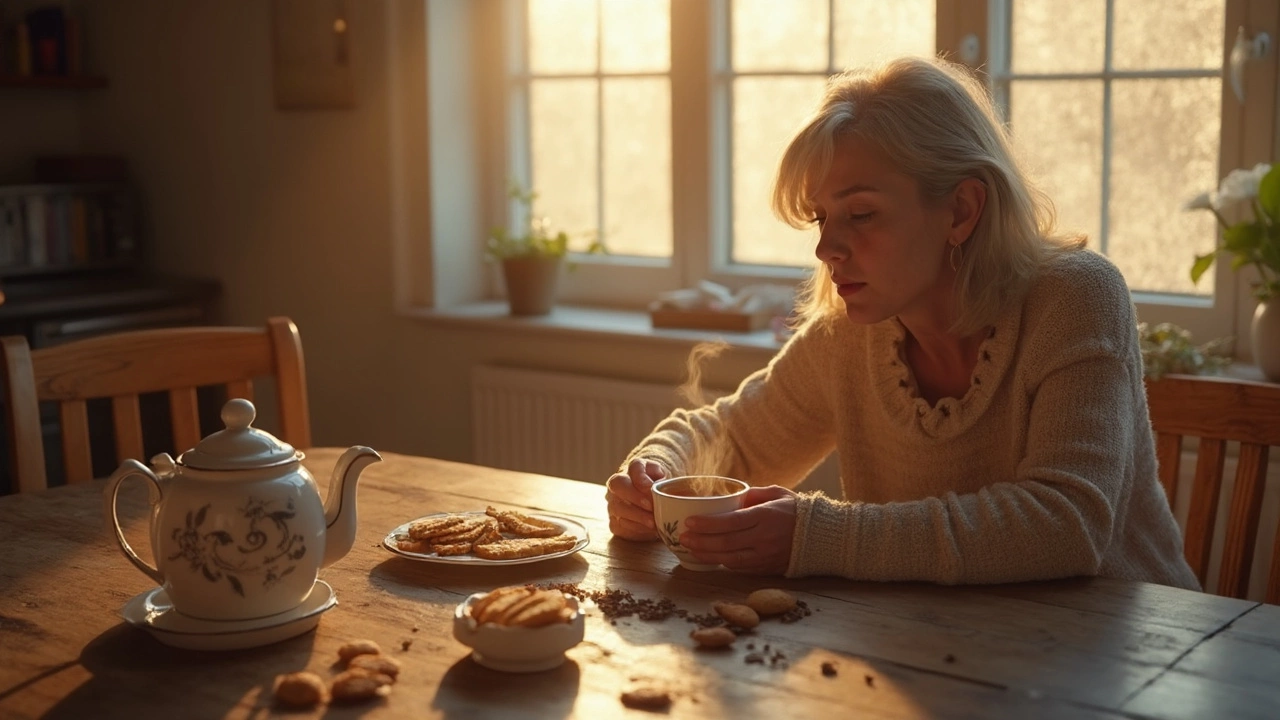You take a sip of tea and instead of feeling cozy, your stomach flips. Minutes later, you’re hugging the toilet. Sound familiar? It happens way more than you’d think. Some folks can handle cup after cup, but others—like me—sometimes end up regretting that second brew.
Let’s get real about what’s going on. Tea has some sneaky ways of upsetting your gut, especially if you’re new to tasting or you drank it on an empty stomach. Ever notice how black or green tea feels more intense than, say, herbal stuff? That’s not in your head.
If you’re tired of cutting your tea sessions short or feeling sick after every tasting, you’re not alone. There are a few surprisingly common reasons you might be tossing your cookies after a nice cuppa. Before you blame the tea itself, it makes sense to look at your habits, the types of leaves you’re using, and how you’re brewing it. Ready to save yourself some misery and figure out what’s really to blame? Let’s break it all down so you can keep sipping—and stop puking.
- Common Culprits: Why Tea Can Trigger Nausea
- Does Empty Stomach Tea Drinking Matter?
- Ingredients and Additives to Watch
- Brewing Mistakes That Could Make You Sick
- Tips for Enjoying Tea Without Tossing Your Cookies
- When to Worry: Persistent Symptoms and Solutions
Common Culprits: Why Tea Can Trigger Nausea
If your cup of tea left you queasy, it’s not just bad luck. Most of the time, it comes down to how your body reacts to what’s in that cup. The main troublemaker is caffeine. Black and green teas pack a punch. If you’re sensitive, even one cup can mess with your stomach or make you throw up. Green tea especially has something called tannins, which can really ramp up that sour, unsettled feeling in your gut—especially if you drink it on an empty stomach.
Let’s check out a few facts so you can spot what’s up. Here’s a quick breakdown:
| Tea Type | Caffeine (mg per 8oz) | Tannin Level |
|---|---|---|
| Black Tea | 40–70 | High |
| Green Tea | 20–45 | Medium-High |
| Herbal Tea | 0 | Low/None |
Caffeine isn’t the only villain. Strong teas (especially from cheap leaves or oversteeped brews) can be rough on your gut lining. Additives—from natural flavors to powdered milk—can make things worse, especially if you have any food sensitivities. Some teas are sprayed with pesticides, which don’t wash off easily and might also bother your stomach.
- Tea nausea happens more if you’re not used to caffeine or drink tea fast.
- Brewing too strong? That extra bitterness is a sign of more tannins, which trigger stomach acid and cause that yucky, sour feeling.
- Green and oolong teas can be especially tough on sensitive folks.
One thing people miss: sometimes it’s not the tea itself, but how it interacts with your current health, medications, or what you ate (or didn’t eat) before sipping. Keeping track of when and what you drink helps nail down the cause. You’re not just being picky—there are real reasons your body might not handle certain teas.
Does Empty Stomach Tea Drinking Matter?
Drinking tea on an empty stomach can mess with you, especially if you go for stronger types like black or green tea. Why? After not eating for a while, your stomach acid is just waiting for something to do. When you introduce tea, especially the caffeinated kind, it ramps up acid production even more. This can lead to that queasy, sometimes pukey, feeling a lot of people talk about.
Another problem is tannins. These natural compounds give tea its dry, slightly bitter taste, but they also irritate your stomach lining. When there’s no food to buffer them, tannins can make your tummy super sensitive. That’s where the term “tea nausea” comes from—it’s not some myth, it’s your body reacting in a real, physical way.
If you’re prone to tea nausea, you might notice it hits hardest first thing in the morning, before you’ve had breakfast. Doctors and nutritionists have chimed in about this—drinking tea before eating can make you more likely to feel nauseous or even throw up, especially if you’re sipping highly brewed or very hot tea.
The fix? Don’t drink tea on an empty stomach if you know you’re sensitive. Even a slice of toast or a few crackers can help. Here are a few tips you might want to try:
- Grab a small snack before your first cup, especially for breakfast tea.
- Go easy on caffeine-heavy teas early in the day.
- Try oat milk or dairy in your tea, which can soften the impact of tannins and acid.
- If you’re taste testing several teas, keep crackers on hand—they’re bland and easy on your stomach.
Bottom line: if you feel like throwing up after tea, your empty stomach is probably to blame. A simple snack could make all the difference.
Ingredients and Additives to Watch
If you find yourself getting sick after tea, it’s worth looking at what’s actually in your cup. Tea isn’t always just tea leaves—there can be a bunch of extra stuff thrown in, and some of these are notorious for making sensitive drinkers feel queasy.
The most common offender is strong tea nausea from high caffeine levels. Black and green teas have more caffeine than you might expect, and if you’re sensitive or drink a lot at once, your stomach might protest—with nausea or even vomiting. Switching to a lighter tea, like white or herbal, can help.
Another sneaky culprit is tannins. These are natural compounds that give some teas a dry mouthfeel, but they’re also tough on empty or sensitive stomachs. Darjeeling, Assam, and strong breakfast blends are loaded with tannins. If tannins are the issue, try adding a splash of milk, because the proteins can bind with them and make your tea easier to handle.
Next up are flavorings and sweeteners. Some teas add artificial vanilla, fruit flavors, or sweeteners like stevia. These can set off digestive issues in folks with sensitive guts or allergies. Always check the ingredient list, especially on fancy blends or anything labeled "naturally flavored."
- Milk or dairy: If your body doesn’t like lactose, that morning milk tea can backfire fast. Try a non-dairy creamer or take your tea plain to see if this stops the problem.
- Herbs: Licorice root, peppermint, and ginger can soothe some people but irritate others. If you consistently react to herbal teas, start eliminating blends one by one to spot your trigger.
- Preservatives and colorings: Big-name “iced tea” bottles usually have sodium benzoate or food dyes. For some, these spark nausea or headaches. Stick to loose-leaf or single-ingredient bags if you’re unsure.
To cut the risk, keep it simple. Go for pure teas without a laundry list of extras. When trying a new type or blend, have a small cup first and pay attention to how you feel for the next hour. That way, you’ll know what works for your body—and what triggers a trip to the bathroom.

Brewing Mistakes That Could Make You Sick
You might think making tea is foolproof, but a few common mistakes can turn your soothing drink into a stomach-churning mess. Screw up the brew, and even the best leaves can make you feel lousy.
One big culprit is over-steeping—letting the leaves sit too long in hot water. This pulls out more tannins, which can give your tea that bitter taste and mess with your stomach lining. Go longer than five minutes with black or green tea, and you’re asking for trouble, especially if you’ve got a sensitive gut.
Water temperature is another huge deal. Using boiling hot water for green or white tea can pump up the bitterness even more. Most green teas do best with water around 75–80°C (that’s 167–176°F). Hit them with boiling water, and it’s not surprising your stomach starts to rebel.
Some people go too strong on the tea. Packing in too many leaves thinking it’ll boost flavor? Yeah, that usually means more caffeine and even more tannins. Both can increase your chances of feeling queasy or straight up throwing up after your cup.
Here’s a quick look at how simple brewing changes can affect your tea:
| Brewing Problem | What Happens | Stomach Impact |
|---|---|---|
| Over-steeping | More tannins, bitter taste | Nausea, discomfort |
| Too-hot water | Bitter, harsh tea | Stomach irritation |
| Too much tea per cup | High caffeine, high tannins | Nausea, jitters |
| Dirty equipment | Old, moldy residue | Possible food poisoning |
Dirty teapots and strainers are no joke, by the way. Mold, old bits of leaves, or stuck milk residue can turn your brew into a germ party. If you’re dealing with unexplained stomach upsets after tea sessions, give your gear a hard look—sometimes the answer is as simple as a good scrub.
Here’s what you should do for a safer cup:
- Steep black and green teas only 2–4 minutes, tops.
- Use the right water temperature (boil for black, but cool for green and white teas).
- Stick to recommended tea portions—about one teaspoon per cup.
- Clean your teapot and infuser after every use.
Get these basics right, and you’ll slash your chances of suffering from tea nausea—and keep enjoying your favorite brews without regret.
Tips for Enjoying Tea Without Tossing Your Cookies
If tea’s making you sick to your stomach, don’t give up on it just yet. There are practical ways to keep nausea at bay and enjoy your cup.
- Eat something first: Drinking tea, especially strong black or green tea, on an empty stomach is a classic recipe for trouble. A light snack—toast, crackers, even a banana—can buffer your stomach and help prevent that queasy feeling.
- Watch your brew time: Brewing tea for too long boosts tannin and caffeine levels, which increases the chance of feeling sick. Stick to the right steeping time—usually 2-4 minutes for green or black tea. Herbal teas are usually more forgiving.
- Pick milder teas: If black and green tea keep making you sick, try something gentler like white tea or rooibos. Peppermint and ginger teas are famous for being easy on the stomach.
- Go easy on additives: Sweeteners, milk, or flavors might upset sensitive stomachs. Try drinking tea plain and see if your gut reacts better.
- Hydrate: Tea is a mild diuretic, which means you lose water. Sip water alongside your tea to avoid dehydration-related nausea.
- Limit caffeine: If you get shaky or nauseous with coffee, tea’s caffeine could be causing you trouble too. Opt for decaf or herbal blends to see if it makes a difference.
Check out this table—it breaks down how much caffeine and tannin you’ll find in popular teas, which both play a big part in tea nausea:
| Tea Type | Average Caffeine (mg per 8 oz) | Tannin Level (Low/Med/High) |
|---|---|---|
| Black Tea | 47 | High |
| Green Tea | 28 | Medium |
| White Tea | 15 | Low |
| Herbal Tea (e.g., Rooibos) | 0 | Low |
Remember, if you’re always feeling sick after tea, it’s worth keeping notes on what you drank and when. Everyone’s gut is different, and sometimes you just need to find your sweet spot—like I did after Max snarfed down my ginger biscuits and left me with plain oatmeal before my morning cuppa. Turns out, that was easier on my stomach.
When to Worry: Persistent Symptoms and Solutions
Throwing up after drinking tea once in a while, especially after a strong cup on an empty stomach, isn't always a big deal. But if you keep getting sick every time—no matter the type or time of day—it’s smart to pay closer attention. Here’s how to tell if it’s just a bad day or something that needs a doctor’s visit.
If symptoms like nausea, vomiting, or stomach pain stick around, don’t just tough it out. Frequent throwing up after tea can point to food intolerances, allergies, stomach ulcers, GERD (acid reflux), or other gut problems. For instance, allergies to substances in tea leaves or additives can trigger strong reactions. Caffeine sensitivity is way more common than most people think and can mess with your stomach big time.
- If you’re seeing blood in your vomit, feeling dizzy, or can’t keep fluids down, get medical help fast—these are emergency signs.
- When you feel queasy after any kind of tea—herbal, black, green—or even plain hot water, your gut might be trying to tell you something major.
- If you start losing weight without trying or have “off” symptoms (like chills, fever, or fatigue), it’s time for a checkup.
Here’s a quick look at when to worry and who to talk to:
| Symptom | When to Seek Help | Who to See |
|---|---|---|
| Nausea after every cup | Lasts several days | Primary care doctor |
| Vomiting plus belly pain | After every hot drink or food | Gastroenterologist |
| Blood in vomit | Anytime | Emergency room |
| Persistent heartburn | More than twice a week | Primary care, then GI doctor |
If you just notice mild discomfort but want to keep enjoying tea without the trouble, here’s what has helped a lot of folks:
- Switch to low-caffeine or caffeine-free teas, like rooibos or chamomile.
- Start with food in your stomach before sipping.
- Brew your tea weaker—the stuff can get strong, especially green and black teas.
- Check the label for added flavors or “natural” ingredients that might mess with you.
- If you have a sensitive stomach, the tea nausea can be less with iced tea or tea lattes rather than hot, plain tea.
Don’t write off your symptoms as “just a fluke” if this keeps happening. Your gut’s doing you a favor by raising the red flag—sometimes tea, though awesome, just isn’t the right fit for everyone. Play it safe, find what works, and don’t be shy about chatting with a doc if tea keeps knocking you down.


